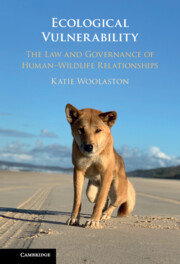Book contents
- Ecological Vulnerability
- Ecological Vulnerability
- Copyright page
- Contents
- Abbreviations
- 1 Introduction
- 2 The Human–Wildlife Relationship
- 3 Friends in the Wild?
- 4 Friends in Law?
- 5 Human–Dingo Conflict on K’gari (Fraser) Island
- 6 Human–Elephant Conflict in Northern Botswana
- 7 Pandemic Vulnerability and Resilience
- 8 Conclusion
- Index
4 - Friends in Law?
The Critical Complexities of International Wildlife Law
Published online by Cambridge University Press: 09 June 2022
- Ecological Vulnerability
- Ecological Vulnerability
- Copyright page
- Contents
- Abbreviations
- 1 Introduction
- 2 The Human–Wildlife Relationship
- 3 Friends in the Wild?
- 4 Friends in Law?
- 5 Human–Dingo Conflict on K’gari (Fraser) Island
- 6 Human–Elephant Conflict in Northern Botswana
- 7 Pandemic Vulnerability and Resilience
- 8 Conclusion
- Index
Summary
Chapter 4 presents international wildlife law as an institutional governance system relevant to local responses to human–wildlife conflict. It finds that there is a lack of any real ‘conflict’ language within the framework and this limits the ability of international law to deal with the problem at the outset. Further, the value orientations discussed within Chapters 2 and 3 are all present in international wildlife law to some extent and so the framework has the same conflict of values that are present in situations of human–wildlife conflict. The chapter traces the development of ‘dominance’ in international law and finds that there are specific principles and legal developments that continue to prevent a positive relationship that is beneficial to both people and wildlife. In addition, the underlying constraints of capitalism, neo-liberalism and sustainable development are discussed. Finally, this part posits that the failure of international law to implement a meaningful interpretation of intrinsic value and animal welfare has meant that such language has not been able to minimise the damage done by the dominant framework. The chapter concludes with suggestions for eco-vulnerability principles to be incorporated into international law.
Keywords
- Type
- Chapter
- Information
- Ecological VulnerabilityThe Law and Governance of Human–Wildlife Relationships, pp. 88 - 125Publisher: Cambridge University PressPrint publication year: 2022

